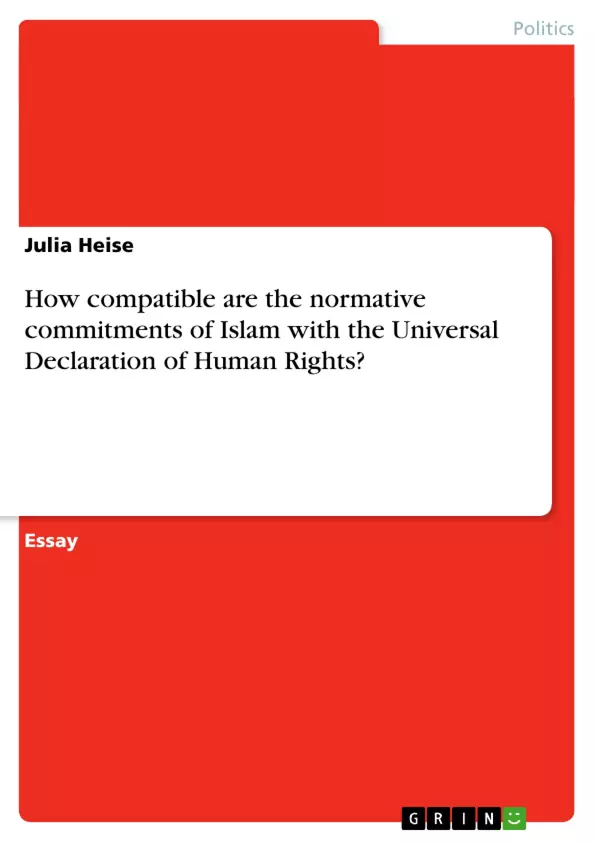During the last few decades, growing attention has been paid to the enforcement (and the prevention of the abuse) of fundamental human rights, mainly facilitated by the International Human Rights Regime. Moreover, human rights-issues are increasingly subject to a controversial international debate, especially in the light of continuous globalisation, events such as 9/11 and rising cross-cultural communication. One specific discussion-point concerns ‘Islam and Human Rights’, the crux of the matter being the compatibility of Islamic normative values with the Universal Declaration of Human Rights (UDHR). Every scholar who approaches this debate more profoundly automatically comes across with the Universalist/Cultural- Relativist-debate. These academics go a step further. They are concerned with the evaluation of the compatibility-analysis and discuss the validity and consequences of such an analysis.1 However, the following paper operates independently of the Universalist/Relativist debate. The aim is to explore the compatibility of the Islamic tradition with the Universal Declaration, and the author believes that the most appropriate approach is an objective comparison, without judging the result of the analysis in any way. 2 The first and second section sketch the basic characteristics of the UDHR and Islam. An understanding of both doctrines is a necessary tool for the purpose of this essay. The third part analyses the compatibility of both doctrines on two levels. The essay then outlines the diverse Muslim positions regarding human rights in Islam. This is essential to be able to draw a sound conclusion concerning the compatibility of Islam with the UDHR, in the last section. 1 Universalists maintain the validity of the UDHR-doctrine and often criticise the Islamic- or other traditions on grounds of their non-conformity with the International Bill of Human Rights. Cultural Relativists, on the other hand, argue that the doctrine of universal human rights is challenged by different moral claims derived from different cultural contexts. Compare Jones (2001:51-76), Brown (1999:103-127), Pollis (2000:9-30), Schmale (1993:3-27), Rüsen (1993:28-46), Donelly (1998: 1-23) and Huntington (1997). 2 Also, the term ‘compatibility’ does not imply a notion of superiority (of one over the other doctrine) in this context.
Inhaltsverzeichnis (Table of Contents)
- The Universal Declaration
- Special characteristics of Islam
- The UDHR and ‘Islam’- a comparison
- Level One: The Koran and Shari'ah
- Level Two: The Cairo Declaration on Human Rights in Islam
- Reflection
- Muslim opinions on human rights
- Conservative ‘Rejectionists' and ‘Apologists'
- Conservative ‘Alternativists'
- Conservative ‘Islamizationists'
- Liberal ‘Re-interpretators' and 'Reformers'
- Liberal 'Secularists'
- Conclusion
Zielsetzung und Themenschwerpunkte (Objectives and Key Themes)
This paper explores the compatibility of Islamic traditions with the Universal Declaration of Human Rights (UDHR). It avoids taking sides in the Universalist/Cultural-Relativist debate and aims to provide an objective comparison between both doctrines. The paper does not aim to judge the outcome of the analysis.
- The characteristics of the UDHR and Islam.
- A comparison between the UDHR and Islamic sources such as the Koran and Shari'ah, as well as the Cairo Declaration on Human Rights in Islam.
- An overview of the diverse Muslim opinions on human rights in Islam.
- A conclusion regarding the compatibility of Islam with the UDHR.
Zusammenfassung der Kapitel (Chapter Summaries)
The first chapter introduces the Universal Declaration of Human Rights as a foundation for the International Bill of Human Rights. It outlines four basic elements of human rights: universality, inalienability, interdependence, and individual rights in relation to society. The second chapter focuses on the special characteristics of Islam, emphasizing the non-separation of religion and state, the emphasis on duties over individual rights, and the supremacy of society over the individual. The third chapter analyzes the compatibility of the UDHR and Islam on two levels: the Koran and Shari'ah, and the Cairo Declaration on Human Rights in Islam. The fourth chapter presents a diverse range of Muslim positions on human rights in Islam, including Conservative ‘Rejectionists', ‘Apologists', ‘Alternativists', ‘Islamizationists', Liberal ‘Re-interpretators', ‘Reformers', and 'Secularists'.
Schlüsselwörter (Keywords)
The paper focuses on the compatibility of the Universal Declaration of Human Rights (UDHR) with the normative commitments of Islam. It examines the relationship between Islamic sources such as the Koran, Shari'ah, and the Cairo Declaration on Human Rights in Islam, and the UDHR. The paper also explores diverse Muslim perspectives on human rights in Islam, including conservative and liberal approaches. Key terms include human rights, Islam, UDHR, Koran, Shari'ah, Cairo Declaration on Human Rights in Islam, Conservative, Liberal, Rejectionists, Apologists, Alternativists, Islamizationists, Re-interpretators, Reformers, Secularists.
Frequently Asked Questions
Are Islamic normative commitments compatible with the Universal Declaration of Human Rights (UDHR)?
The paper explores this complex relationship by comparing the UDHR with Islamic sources like the Koran and Shari'ah, noting both points of convergence and divergence.
What is the Cairo Declaration on Human Rights in Islam?
It is a declaration by member states of the OIC that provides an Islamic perspective on human rights, often discussed in contrast to the UDHR.
What are the core elements of the UDHR?
The UDHR is based on four basic elements: universality, inalienability, interdependence, and the focus on individual rights in relation to society.
How do conservative and liberal Muslim views on human rights differ?
Views range from 'Rejectionists' who see the UDHR as incompatible with Islam, to 'Reformers' and 'Secularists' who seek to reinterpret Islamic traditions to align with universal human rights standards.
Does Islam emphasize duties over individual rights?
Traditional Islamic scholarship often emphasizes the duties of the individual toward God and society, sometimes placing the supremacy of the community over individual rights.
- Arbeit zitieren
- Julia Heise (Autor:in), 2005, How compatible are the normative commitments of Islam with the Universal Declaration of Human Rights?, München, GRIN Verlag, https://www.hausarbeiten.de/document/36673


